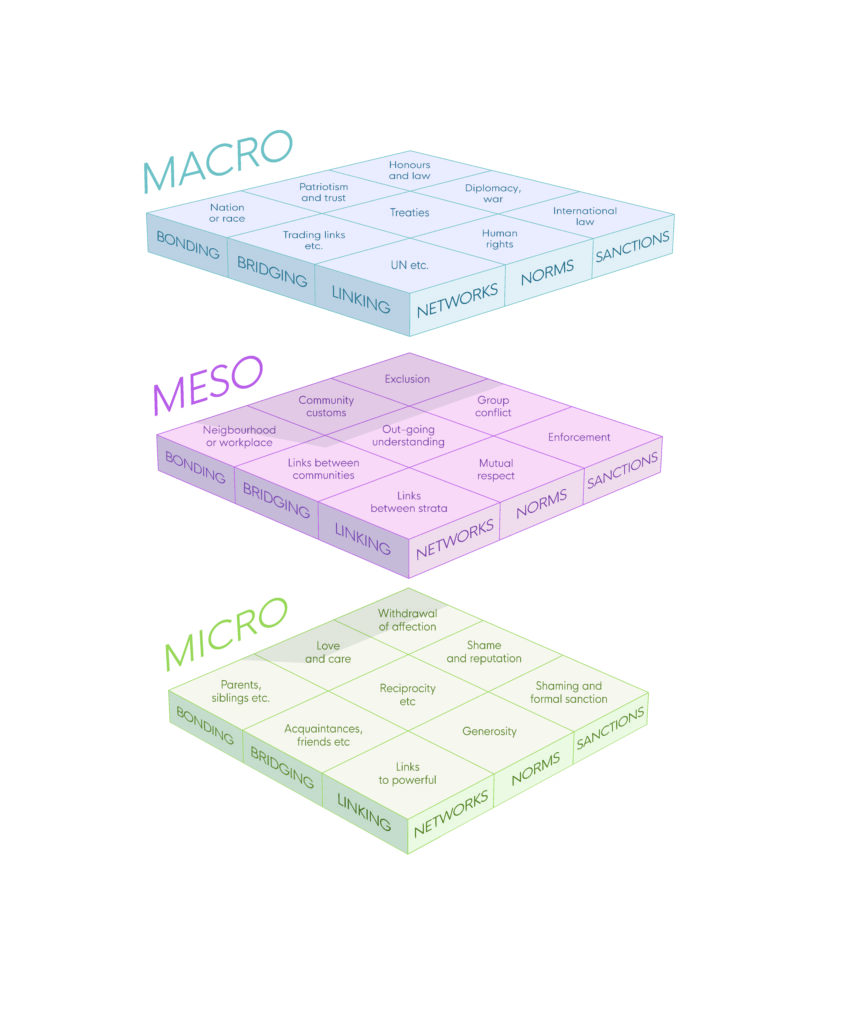What is social capital?
Downloads

What is social capital?
Social capital is the ‘glue’ that holds societies together.
The Office for National Statistics (ONS) defines social capital as:
“the extent and nature of our connections with others and the collective attitudes and behaviours between people that support a well-functioning, close-knit society.”
Research by the OECD shows that higher levels of social capital are beneficial and can be associated with better outcomes in health, education, employment and civic engagement.
Social capital is one of several interconnected capitals that underpin economic growth and future wellbeing.
Capitals are our wealth, the stocks and flows of resources, not captured by success metrics like GDP or life expectancy, and underpin our future wellbeing.
For OECD, the four capitals are:
- Social capital = addressing the social norms, shared values and institutional arrangements that foster cooperation
- Natural capital = environmental stocks and systems that generate benefits for people, including ecosystem services, raw materials, and a stable climate.
- Human capital = the health and skills of the population.
- Economic capital = financial goods, physical infrastructure and technology.
The UK government’s Levelling Up White Paper and Cambridge University’s Bennett Institute for Public Policy further split out the following types:
- Social capital = the strength of communities, relationships and trust.
- Knowledge capital = the accumulated ‘best practices’ and ‘ways of doing things’ enabling innovation in management and business processes.
- Institutional capital = the quality and reliability of governance and relationships between institutions and organisations.
Institutional capital, governance and democracy are also used for the macro parts of social capital, for example in Levelling Up, New Zealand Living Standards Framework and Carnegie’s SEED model.
There are several ways of conceptualising social capital. Our work as a centre focuses on identifying what works to improve these capitals and understanding how they work together as a system.
Social capital in policy and research
While we can measure the individual components, levels and characteristics of social capital, there is no singular summary measure of the concept.
This is because social capital is multidimensional, operating on individual (micro), community (meso) and national (macro) levels. It is marked by different types of social association that span bridging, bonding and linking relationships.
Bonding capital operates within a group or community. Examples are neighbourhood belonging and social support.
Bridging capital operates between social groups, social class, race, religion or other socioeconomic demographic or characteristic. Examples are community cohesion.
Linking capital describes norms of respect and networks of trusting relationships between people who are interacting across explicit, formal or institutionalized power or authority gradients in society.
A conceptual map of social capital, after David Halpern’s 2005 book Social Capital, is pictured below. It includes examples of things policy makers or researchers might look at when investigating social capital between the social associations and at different levels.

A golden opportunity for VCSE organisations
Voluntary, community and social enterprises actively generate social capital of all kinds through their work. Large or small, they are uniquely placed to contribute rich, practical learnings to the narrative, filling a gap where academic research is limited.
Intentionally capturing and communicating insights is useful for those looking to strengthen communities. It also offers a way for charities to tangibly demonstrate their value and get recognition from decision-makers.
Explore more
Read about our social capital work.
Downloads
You may also wish to read the blog article on this document.
Downloads
You may also wish to read the blog article on this document.
![]()
[gravityform id=1 title=true description=true ajax=true tabindex=49]
